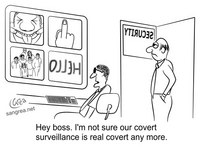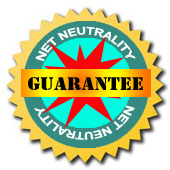 With enemies like these…
With enemies like these…
Until recently, net neutrality was a difficult issue to explain at a dinner party. It was even more of a struggle to get anybody worked up about it. Now, thanks to the major Internet service providers (ISPs) Comcast and Bell-Sympatico, the stakes are crystal clear and the acrid scent of a smoking gun hangs in the room.…it may seem we don’t even need friends, but we do.— How the Grinches Stole ‘Net Neutrality’ Internet service providers play favourites with video, large files and political sites. By Wayne MacPhail, the Tyee, Published: December 27, 2007
A pretty good pro-net neutrality writeup follows. This is the gist:
Is it in the carriers’ best interest to allow upstart cheap phone companies like Skype or Vonage to suck up bandwidth with its inexpensive and excellent service? Nope, but in a free market and a neutral Internet, upstarts happen. The traditional players just don’t like it much and want the nonsense to stop.You want upstarts? You want net neutrality.
That plus the duopoly wants to control content: Continue reading






